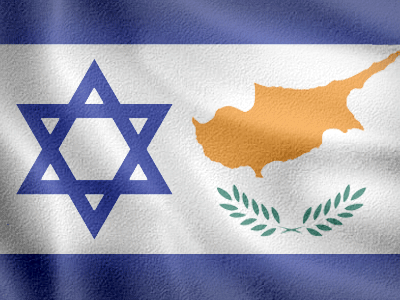Israel's New Allies
Netanyahu's historic visit to Cyprus is evidence of a new trend in Israeli peripheral policy.
 Israeli prime minister Benjamin Netanyahu is scheduled to visit Greek Cyprus this month in what will be the first ever visit by an Israeli leader to the neighboring Mediterranean island. And, according to UPI, Nicosia is currently studying an Israeli request to station military aircraft in its territory.
Israeli prime minister Benjamin Netanyahu is scheduled to visit Greek Cyprus this month in what will be the first ever visit by an Israeli leader to the neighboring Mediterranean island. And, according to UPI, Nicosia is currently studying an Israeli request to station military aircraft in its territory.
These are two developments in what is fast becoming a regional alliance driven by a mutual fear of and antagonism toward Turkey, which has vaguely threatened military action against both countries—Cyprus in connection with its offshore gas-drilling activities, which Turkey has charged impinge on Turkish Cypriot waters and possibly on underground gas deposits; and Israel in connection with what Turkey regards as Israel's "illegal" blockade of the Hamas-ruled Gaza Strip. Turkey has recently upgraded its naval presence in the eastern Mediterranean and has threatened to provide naval escorts for ships carrying what it terms "humanitarian" aid to Gaza. (Two years ago, Israel boarded a flotilla of Turkish ships bound for the Gaza Strip and, on one ship, the Mavi Marmara, killed nine Turkish activists who attacked the boarding party. Ever since, Ankara has demanded that Israel apologize and pay compensation. Israel has refused. A UN inquiry subsequently deemed the blockade of the Gaza Strip legal, though it criticized what it termed Israel's "excessive" use of force against the flotilla.)
But the bounding Israeli-Cypriot alliance should be seen within a wider context. The increasing aggressiveness of Iran, with its ongoing nuclear-weapons program; the increasing power and militancy of Islamist Turkey; and the empowerment of Islamist parties in the surrounding Arab world as the main upshot of the "Arab Spring" have all combined to push Israel to reconfigure its "peripheral policy,” conceived by Israel's founding prime minister David Ben-Gurion back in the 1950s, following the 1948 pan-Arab onslaught against Israel and continued Arab belligerence and rejectionism thereafter. Ben-Gurion sought to forge alliances with Israel's enemy's enemies—that is, the non-Arab countries and minorities around and inside the neighboring Arab states (Iran, Turkey, the Kurds, Lebanese and Southern Sudanese Christians, for example).
Today's realities—which include both already radicalized and radicalizing neighboring Arab states and parties and increasingly militant non-Arab Muslim states in an outer ring (Turkey, Iran, Pakistan)—have prompted Israel to expand its concept of the potentially friendly or even aligned "periphery" to include such states as Azerbaijan, India, Greece, Bulgaria, Romania and (Greek) Cyprus. Last month, Southern Sudan's president, Salva Kiir Mayardit, visited Israel, and Netanyahu is expected to reciprocate the visit this year. For decades, Israel supplied southern Sudan's Christian and animist rebels with arms and training in their guerrilla war against (northern) Sudan's Muslim Arab government. Now that the South is independent, it is likely that relations with Israel, including military relations, will flourish.
The announcement of the Netanyahu visit to Nicosia followed news reports that Israel and Cyprus have secretly signed an agreement to cooperate in protecting the gas-drilling sites—the newly discovered gas fields are apparently worth tens of billions of dollars. The Iranian-aligned Hezbollah organization, which effectively controls Lebanon, has recently stated that Israel's offshore gas-drilling installations are justifiable targets for attack, claiming that some of the fields are under Lebanese "economic" waters.
For decades, Cyprus—like Greece itself—held Israel at arm's length, preferring friendship and trade with far larger and wealthier Arab states. But militant Islam—long seen by Greeks as oppressive and threatening—apparently now also has the Greek Cypriots worried. Islamist Turkey may be viewed by Washington as "moderate," but this is not how some of its neighbors see it.
In December 2010, Israel and Cyprus reached agreement demarcating the economic maritime border between them, an agreement denounced by Turkey as "madness." Recently, Cyprus's defense minister, Dimitris Eliades, visited Israel—another first—and signed an intelligence-cooperation agreement with his counterpart, Ehud Barak. The Cypriots are apparently interested in Israeli assistance in monitoring the air space above the gas fields and drilling equipment and in augmenting their (small) navy's patrols in their economic waters. Barak has asked the Cypriots to allow Israel to station aircraft in the Papandreu Air Base outside the town of Paphos in western Cyprus. And two months ago, the Israeli and Cypriot air forces held a joint exercise. It remains unclear whether Netanyahu’s visit to Israel’s long-troubled Mediterranean neighbor will be truly historic, but all signs point to a stronger alliance.
Benny Morris is a professor of history in the Middle East Studies Department of Ben-Gurion University of the Negev. He is the author of 1948, A History of the First Arab-Israeli War (Yale University Press, 2008).
